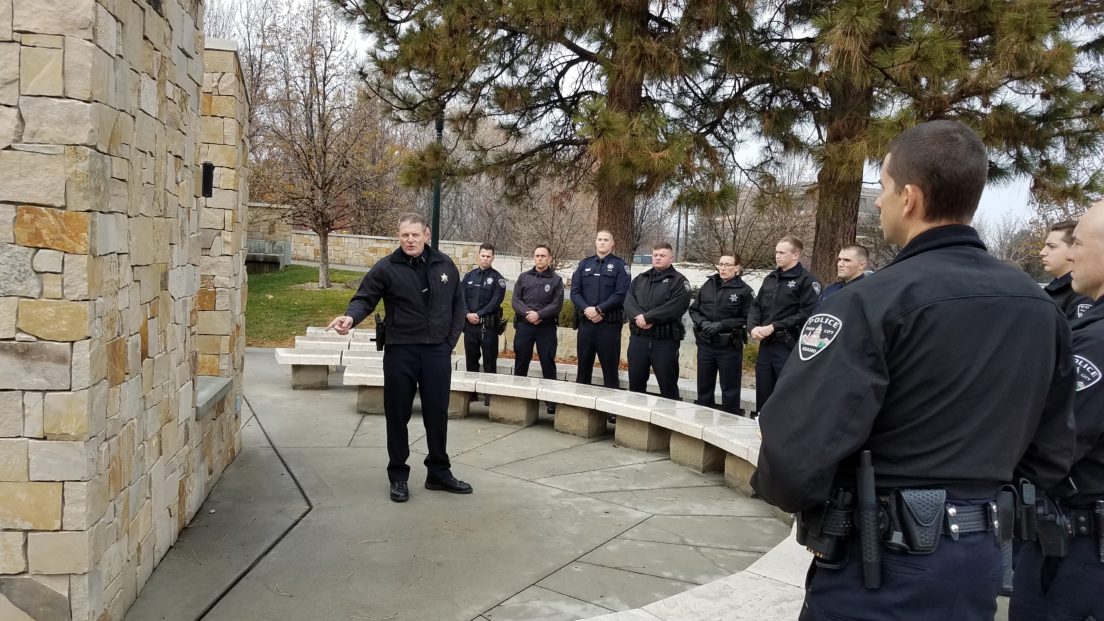Over my 8 years as the regional officer in Idaho with Pride Foundation, there have been countless moments where I’ve been inspired and amazed by a donor’s generosity, a volunteer’s unwavering commitment, or an ally’s compassion. Of all of the experiences I’ve had and the many partnerships I’ve formed, one of the most impactful has been my work with the Boise Police Department (BPD) and Police Chief Bill Bones.
Since Bones was hired as chief in early 2015, he has strived to make the police department and its officers more welcoming and inclusive of Boise’s diverse population, including LGBTQ, Jewish, African American, and Muslim communities. He appointed the department’s—and Idaho’s—first LGBT Liaison Officer, Dan Lister. Earlier this year, he asked me to sit on a new Chief’s Community Advisory Panel, bringing an LGBTQ voice to the table to talk about citywide issues ranging from the opioid crisis to homelessness.
Since then, Bones has continued an educational tradition with new officers on the eve of their graduation from the police academy, gathering them at the Idaho Anne Frank Human Rights Memorial. They get a guided tour of the Memorial, and hear about the unique challenges and acts of discrimination experienced by marginalized groups in the city.
I’ve spoken at this event on several occasions alongside community leaders like Rabbi Dan Fink of Congregation Ahavath Beth Israel in Boise, and Phillip Thompson, board member of the Idaho Black History Museum. At this annual event—the most recent of which took place just last month—my fellow speakers and I offer our personal perspectives as Idaho residents.
This year, I was honored to share a little about my experience as an openly gay man growing up and living in southwest Idaho. I also gave a broader look at the LGBTQ movement, Pride Foundation’s work, the fears experienced by our community and all marginalized groups at this polarizing moment in our country, and the importance of treating everyone with dignity and mutual respect.
The Chief himself concluded the event, reinforcing the message that the police have a duty to protect and serve everyone in their community:
“You have the ability to make a difference,” he reflected during his remarks. “By upholding everyone’s human rights, you will look back on your time as Boise police officers and say, ‘I stood up for what was right. I stood up for those who didn’t have a voice. I was the strength for those who had no strength.’”
I see incredible significance behind these efforts toward relationship building, especially given the problematic treatment of LGBTQ people by police both historically and currently on a national scale—particularly LGBTQ people of color—and the divides that exist because of it.
It is my hope that having this opportunity to speak to these new officers is helping to create empathy and building bridges between the BPD and historically marginalized communities they serve every day.
This ongoing education and community building serves as an excellent model of what I believe all law enforcement agencies should be doing with their new officers. It takes time to build trust, create empathy, and repair relationships—and I emphasize this point when speaking to the new officers.
This is an important first step in the work to address enduring inequities that thrive in so many institutions and systems—and I am grateful to be part of this partnership and look forward to seeing BPD’s commitment to addressing these inequities continue to grow and deepen.
Steve Martin is the Regional Philanthropy Officer in Idaho. You can see more of Chief Bones’ speech here.
